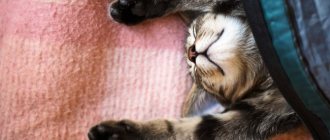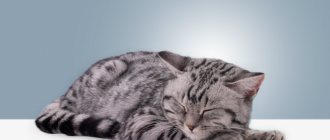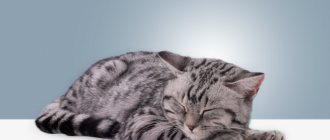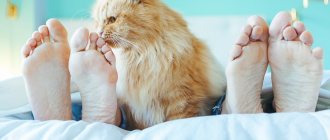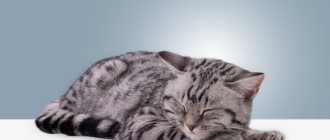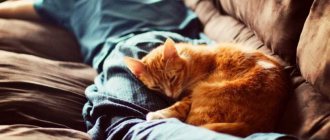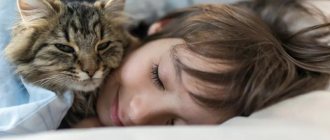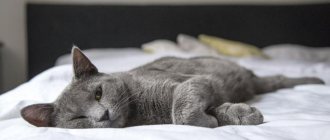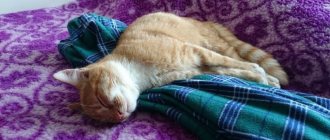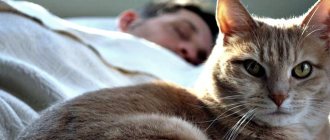Welcome, dear readers, to our website!
Here you can find out many interesting and incendiary stories, many facts and explanations about the world. On our website you will find a lot of useful and interesting information from various fields of science, sports, nature, animals and much more. Read and share with friends!
In this article we will find out why cats sleep a lot.
Domestic cats are notorious sleepers. Their owners notice that their pets experience long periods of sleep, alternating with increased activity. Veterinarians say that 16-20 hours of sleep is quite normal for cats, but there are certain periods of actual sleep and others of napping.
The cycles vary greatly; within each of them, completely different processes occur in the bodies of people’s beloved pets. Why do cats need to sleep so much, and what happens physiologically during these periods? Experts are ready to answer all those who are curious.
Sleep Features
The sleep of a domestic feline is clearly regulated; if the cat is healthy and not disturbed by anything, then it sleeps for two-thirds of the day. If your cat begins to sleep poorly, you should consult a veterinarian or try to find out the causes of insomnia yourself. The number of hours spent sleeping depends on several reasons:
- season;
- age;
- degree of satiety;
- weather;
- pet activity;
- homely atmosphere;
- health status, etc.
The more a pet weighs, the lazier and less active it is.
Such specimens are capable of sleeping for up to 20 hours. But his stay in the kingdom of Morpheus does not last continuously, the fluffy dormouse constantly wakes up to eat, then play, look out the window, meet the owner, wake him up, in fact, he has a lot to do.
Like humans, a cat’s sleep goes through two phases that differ in the animal’s physiology and behavior. At first it’s a nap. During this phase, all processes slow down; heartbeat, breathing, blood pressure drops.
At this stage, the cat can be returned to wakefulness without difficulty. After a half-hour nap, the deep phase begins. During this period, it is practically impossible to wake her up.
If the initial period was not disturbed by loud, sharp sounds, then after 10 minutes a dive into the deep phase occurs. A sleeping mug can twitch its tail, move its paws, meow, etc. Its body is completely relaxed, it can even fall, rolling smoothly and gracefully if it falls asleep on the edge of a sofa or window sill.
At the same time, drowsiness and deep phase alternate each other. But in general, the cat sleeps deeply within 70%.
After sterilization
It should be noted that after sterilization surgery, the cat does not eat and sleeps all the time; this is a normal state after anesthesia. If this period lasts for 24 hours, then there is nothing to worry about. If a day has passed and the condition does not change, you need to urgently see a veterinarian.
During the first 24 hours, you don’t need to force the cat to get up or wake him up if she doesn’t want to. Just like insisting on food and drink. Give her a little rest, recover, and she will again delight you with her cheerful appearance.
If the anesthesia has not worn off and the cat is not sleeping, gets up and tries to move around the apartment, do not let it out of sight so that it does not accidentally get injured. It’s better to take her in your arms, calm her down, and maybe she’ll fall asleep. Sleep is the best medicine here.
Cat sleep: how long does it last?
The duration of sleep depends on many factors. This includes age, room temperature, sense of security, activity, and weight of the pet. Cats sleep for long periods of time, spending more than half their lives simply snoring, but unlike humans, cat sleep is rarely deep.
How does a cat sleep? For many, this still remains a mystery, but research allows us to lift the veil of secrecy. An animal's sleep can be divided into several cycles and phases:
- Preparation - choose a warm place, preferably elevated above the floor, soft and comfortable. The cat stomps to check whether it is safe to lie here, and also to create a depression. He stretches, relaxes and lays down;
- Napping - the cat sleeps calmly, does not make sounds, most often lies in a ball or on its stomach. Breathing slows down at this time, the heart beats slower, but the pet is very sensitive. If you touch him, he will wake up immediately. This phase lasts no more than half an hour;
- Deep sleep - occurs after a nap if the cat is not bothered by anything. Muscle tone is completely absent, the eyelids begin to twitch, convulsions, cramps, twitching of the paws and whiskers may appear. Your pet dreams: hunting, attacks, treats, which leads to growling, turning from side to side, meowing. NREM sleep lasts about 20 minutes, and then it is replaced by drowsiness again;
- Waking – Depending on why the cat woke up, its awakening will vary. So, if the pet is awakened by appetizing smells or a slight feeling of hunger, the cat will be lethargic, stretch, and close its eyes. If the reason lies in sharp sounds and a sense of danger, the animal will quickly emerge even from the stage of deep sleep.
Seals rest a lot, their sleep is over 16 hours a day. Babies and older pets sleep the longest: young and active animals have much more worries and hobbies. During sleep, babies have to gain strength and grow better, so kittens rapidly gain weight and grow up very quickly.
However, even at home, the cat does not cease to be a predator and hunter. He sleeps extremely carefully, constantly wakes up, and as soon as you open the refrigerator or unwrap the rustling wrapper, his little ears will rise, and the pet will restlessly inspect the territory.
Kittens sleep
Cat babies are born blind and deaf. Eating and sleeping under mother’s warm belly are the only events and joys of their life. But in these little ones, the fast phase predominates and accounts for up to 70 percent - to put it simply, they dream, and sleeping kittens experience a lot of emotions.
Even newborn kittens dream.
Even just yesterday, kittens that were born are happy about something and are afraid of something in their dreams - they twitch their paws, squeak, even hiss, opening their toothless mouths.
Newborn kittens sleep almost 24 hours a day and are only awake when they eat. This is completely normal, because all children grow well in their sleep. But the kids have already grown up, and the world of their interests is expanding every day further and further beyond the “nest” in which they were born. Kittens play a lot and actively, receiving a lot of impressions every minute, and proper rest is vital for them.
All cats love to sleep with their owners - even the smallest ones.
In a dream, a kitten not only regains its strength, its brain works tirelessly - systematizes and analyzes the information received, puts all recent events “on the shelves.” As the baby grows up, it gradually enters an adult sleep pattern and by four to five months sleeps as much as its mother.
Possible diseases and their symptoms
Long sleep can also indicate illnesses of your beloved pet. You should conduct a thorough examination and observe the cat for some time. For what? To understand whether this is serious or everything is normal. The following symptoms may indicate the presence of pathologies.
- Vomiting and diarrhea.
- Decreased appetite.
- Dry and hot nose.
- Inflammation of the eyes or mouth.
- Labored breathing.
- The presence of mucus or blood in the discharge.
- Hair loss or itching.
- Refusal of water or thirst.
- Weight. Those pets who are overweight have difficulty moving around and leading an active lifestyle. That's why they sleep and eat more. But if you leave it just like that, the animal may develop other diseases against the background of obesity. We must fight excess weight.
The presence of infections or allergies, as well as diseases of the cardiovascular, digestive and excretory systems, forces the cat to spend more time sleeping. Various stresses and unfavorable surroundings can provoke these diseases.
As soon as you notice that your cat has restless sleep, is apathetic, and has lost his appetite, you should be wary. Having determined the exact symptoms, you should take your pet to the doctor to identify the source of the disease and what influenced the environment of such sleep.
The cat will definitely show you that he feels bad. In any case, you will notice this by his behavior.
Energy storage
It's funny, but true: why cats sleep so much, scientists still haven't fully understood. There is a version that this is in some way connected with their hunting instincts and twilight lifestyle. In the wild, felines usually go hunting after dark.
And they sleep during the day to accumulate energy for night chases. Domestic cats have retained these ancient instincts to some extent - and diligently sleep during the day in order to gain strength for catching prey. But since, regardless of the time of day, there is no one to catch in our apartments, then at night the cats... also sleep - just in case.
Normal sleep duration for an animal
As you already know, cats can sleep all day. And this is not always a bad thing. There are certain standards under which you can determine whether your patient is sleeping correctly or whether there are deviations.
In kittens
Little fluffies sleep all day, much more than adults. They can sleep for about 23 hours a day. With each month of growing up, time decreases. Such long sleep is due to the fact that babies do not have to go anywhere. They wake up only to sleep and go to the toilet, being close to their mother all the time. In sleep, the baby’s body strengthens and becomes stronger every day.
In their sleep, kittens gain strength to grow healthy and active.
In mature individuals
The sleep norm for adult cats is 15–17 hours. The cat needs this time to sleep and gain strength. But if a cat sleeps a little more at this age, that’s also normal. For some, 20 hours is enough, and for others, even 14 hours. Sleep is very individual and it is important to base your analysis on the cat’s lifestyle. After all, an overweight, inactive, lethargic cat will definitely sleep longer than usual.
When a cat takes a nap, it is a normal rest for him, an inadequate sleep. Nowadays, we can say that he turned on the energy saving mode.
In older animals
As soon as your favorite cat passes the 8-9 year mark, such a cat will be considered elderly. Older cats sleep all the time, even for more than 20 hours. This is due to the fact that all its functions in the body are already working very slowly and for their quiet operation, the cat will sleep, restoring its energy. At this age there is very little energy.
Older cats need more time to sleep to restore the energy they expended, even if it is low.
Causes of long sleep
Scientists suggest several reasons for prolonged sleep in cats.
- Activity. A cat is a very active animal, so it needs a long time to recuperate, which it does in its sleep.
- Nutritional image. Being carnivores by nature, pets prefer mainly protein foods, which require a long time to digest.
- Thermoregulation. Scientists have concluded that cats adjust their body temperature during sleep. Researchers note that in the summer, animals sleep longer.
- Sterilization. This physiological fact also affects the duration of sleep. A pet that has undergone surgery does not need to guard the territory or obtain food, so they spend their free time sleeping.
Some peoples see a magical meaning in a cat's prolonged sleep. Thus, superstitious people believe that when a cat sleeps, it protects the home from the penetration of evil spirits, evil spirits, and also from evil magic. Therefore, waking her up is dangerous.
How cat breed affects sleep duration
Different breeds of cats sleep differently, so the amount of sleep each breed will have will vary.
Persian cats, ragdolls, British and Scottish cats sleep the longest. They are not particularly active in life, they are more lazy and after eating they immediately run to bed.
Siamese, Bengal, Siberian and Abyssinian, Egyptian cats are more active, and their sleep is usually less or normal. These breeds love to play and hunt.
Siamese cats do not like to be ignored. They retain their childish character and carry it throughout their lives. Therefore, they definitely need to lead an active lifestyle.
Differences in sleep depending on breed
Breed characteristics, character and temperament are also reflected in cat dreams. Of course, homeless “noblewomen”, forced to earn their own food, would also not mind sleeping all day - but who will give it to them? Such animals have to stay awake for at least five hours a day.
Another thing is well-fed domestic lazy people, not even necessarily very thoroughbred. “Indoor” pets, especially if they are sterilized, are able to sleep almost the entire day - up to 22 hours a day! Of course, every cat is a bright individual, but different breeds also have different attitudes towards sleep:
- The leaders in the Dormouse ranking are the imposing, handsome Persians - ambitious and narcissistic cats are very lazy and phlegmatic in everyday life;
Persian cats are big fans of taking a nap at their owner's feet.
- Many British, Burmese and American shorthair cats are distinguished by sanguine balance - they sleep “according to circumstances” and in moderation;
- Representatives of such aggressive and even dangerous breeds as jungle and Siamese cats cannot afford to sleep for too long - almost all the time they are tense and ready to attack, and relax only for a short time;
- and the cute bald ones stand out completely apart: hairless sphinxes, Devon Rex, Ukrainian Levkoy and other devoted and affectionate cats constantly need warmth and care - they are ready to sleep as much as they want, but only next to their beloved owner; the rest of the time, animals can show unusual activity, and when carried away, completely forget about sleep.
Hairless cats are actively awake and sleep soundly.
The meaning of sleep positions
The position in which your cat prefers to sleep has its own meaning:
- on the stomach or on the side - the most common and natural position of a cat’s relaxed body during sleep; the animal is calm and does not experience any problems;
- on the back - a position of special trust; kittens sleep this way more often than adult animals; A cat is only capable of opening its defenseless tummy if it is absolutely sure of its safety;
- curled up - this position indicates that the cat needs some kind of protection; perhaps she is just cold, then she can also hide the tip of her nose in the fur;
- huddled in a secluded place - most likely, your cat is experiencing a certain uncertainty or feeling of discomfort; take a closer look to see if everything is fine with her;
- unusual or unnatural positions that your sleeping pet manages to assume most often indicate the special creativity of his feline personality and satisfaction with life.
What dreams do cats have?
Cats dream - this is a scientifically proven fact. What do our favorite purrs dream about? French neurophysiologists from the University of Lyon were looking for an answer to this question. Their findings authoritatively confirmed what one could have simply guessed: in their dreams, cats live some kind of parallel lives that differ little from reality.
In dreams, cats live parallel lives.
They hunt and simply eat, chase prey and run away from pursuit, fight with enemies and caress their cubs. According to scientists, there are still more positive things in cat dreams than unpleasant moments. But here’s what’s curious: neither cats nor cats ever dream of erotic scenes. Scientists have not yet found an explanation for this.
When should your pet's sleep cause alarm?
Cats are nocturnal animals; it is believed that they should be awake at dusk, but in the apartment it is completely different. After the owner goes to bed, nothing interesting happens. The cat sees that the world has become boring, so he won’t play or entertain himself either.
In some cases, sleep disturbances should cause alarm to the owner:
- The pet began to sleep little, he is very active, mobile, does not rest at all, such symptoms are especially suspicious for an elderly ball;
- After waking up, your four-legged friend looks lethargic, feels unwell, and is noticeably depressed. Why is this happening? Most likely, the matter is due to the onset of the disease;
- The cat sleeps a lot, but sleep is poor. Often the pet cannot lie on the side where it feels pain; even standard palpation at home will reveal problem areas;
- The animal sleeps poorly and sleeps little, tosses and turns, meows pitifully, and asks for help. Or the cat has completely stopped resting normally, doesn’t eat at all, and behaves restlessly.
The appearance of such symptoms, any deviations in behavior: loss of appetite, fever and apathy may indicate that not everything is normal with the animal. It is better to contact a veterinarian who will examine the cat and, if necessary, help restore the usual routine.
Cats love to eat and sleep, this is not surprising, this is how an ordinary cat’s life works. Lack of care leads to cats sleeping for a long time, they become lazy homebodies - and this is completely normal. On the other hand, when your pet stops sleeping, you should think: is everything okay?
How to change your indoor cat's sleep pattern?
The sleep schedule of a domestic cat or cat needs to be changed in situations where the animal sleeps during the day and is awake at night, preventing other family members from resting. This behavior does not lead to anything good - the owners feel irritated and take out their anger on the pet, which, in turn, begins to take revenge - the problem worsens even more.
The normal sleep pattern of a domestic cat can be restored by moderate activity during the day, the attention of the owners and dense food in the evening, as well as a minimum of reasons for alarming the animal and the complete elimination of stress.
Domestic cats sleep long and sweetly, which is a variant of the norm. But if long and restless sleep is accompanied by lethargy, refusal to eat and other dangerous symptoms, do not delay a visit to the veterinarian - early treatment can prevent the development of a serious disease that threatens the health and life of your pet.
See also: a cat sleeps at the owner’s feet - reasons
Where do cats like to sleep?
Fluffy chooses places to fall asleep that are cozy, quiet, where they feel completely safe. Often this place is located at a height from where, half asleep, you can survey the room with one eye.
There are many sleepyheads who take a liking to their owner’s bed, and if the owner doesn’t mind, especially if the cat’s owner is a child, then she is guaranteed a warm place under the blanket or on the pillow. Often, pets settle directly on a person, whether he is sitting or lying down.
But sometimes their preferences surprise their owners. This is how some pets constantly settle down at the feet or on the head of a person. Biologists explain the position in the legs by the cat’s reluctance to be disturbed by stroking, snoring, and tossing and turning in its sleep.
And the constant falling asleep on the head is explained by the animal’s sociability and love of touch. The choice of very exotic places - a heating radiator, a flower pot - is explained by the fact that this particular place seemed calm, there were all the conditions for a restful sleep.

